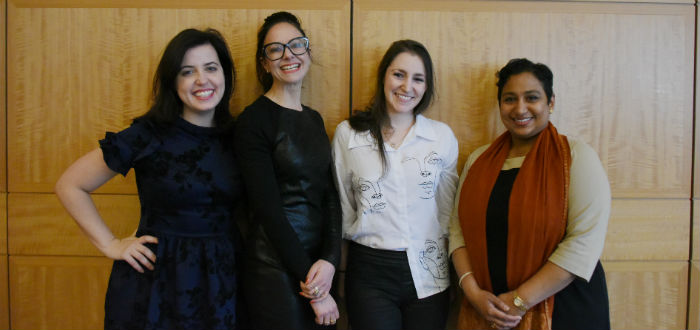By Kathryn Roberts
With the recent rise of the #MeToo movement and the spread of awareness regarding sexual abuse and misconduct, Fordham’s Women, Gender and Sexuality Studies department (WGSS) plans to incorporate the movement’s teachings into the classroom in hopes of initiating discussion on the issue.
The #MeToo movement, which was started in 2006 by activist Tarana Burke to help survivors of sexual assault, has been actively present on social media. The hashtag has become a way for victims of sexual abuse and harassment to share their stories.
Since the October 2017 allegations of sexual misconduct began to surround Hollywood mogul Harvey Weinstein, many women have come forward with allegations of Weinstein and other high profile men in media committing acts of sexual assault, harassment or misconduct.
In Fordham’s Women, Gender and Sexuality Studies department, both teachers and students hope to incorporate the movement into their classrooms.
Professor Orit Avishai, women, gender and sexuality studies co-director, said she often includes topical content in her courses.
“In my courses I always rotate some of the content to reflect current issues,” she said. “I’m quite sure that next time I teach my gender courses, as well as my introduction to sociology course, I’ll include a unit addressing the movement and the larger issues that it speaks to.”
Colleen Granberg, FCRH ’18, has taken classes within the WGSS department and said she has noticed a change in her classrooms since the #MeToo movement’s rise.
“I think that people are coming into class with a much more nuanced understanding of the factors at play, such as power dynamics in the workplace and the institutional protection of habitual predators,” she said.
This understanding has contributed to better class discussion, according to Granberg.
“People are learning from reading about it in the news and on social media, and while sometimes that information is inaccurate or oversimplified, it has definitely allowed us to have interesting discussions in class because students are approaching these topics armed with a new knowledge and context regarding sexual assault,” Granberg said.
Since the Weinstein story broke, over 60 women have come forward with accusations against him, according to Elle. In addition to this, dozens of men have been accused of committing similar types of sexual misconduct, including comedians Louis C.K. and Aziz Ansari, actors Kevin Spacey and James Franco, journalists Charlie Rose and Matt Lauer and others.
One of the most controversial cases regards former U.S.A. Gymnastics Association team doctor Larry Nassar, who was sentenced to 40-175 years in prison after more than 150 victims came forward accusing him of sexual assault.
Most of the classes within the WGSS department focus on understanding femininity and gender through the experiences of women, but Associate Professor of Journalism and Media Studies Amy Aronson said she hopes the department can eventually add more courses about masculinity in order to create more of a discussion amongst her students regarding topics like the #MeToo movement.
Aronson said that masculinity is a box in the same way that femininity can be. It imposes expectations on men for certain kinds of behavior and represses other kinds of behavior, according to Aronson.
A department that addresses masculinity allows students to examine larger questions that address the intersections and dynamics in gender, according to Aronson.
“Many gender studies programs have really embraced masculinity studies in the last 20 years, and to really become moved from being primarily women’s studies programs to being really truly gender studies programs that look at masculinity and femininity and the dynamics among them,” she said.
While most of the students in WGSS are female, Aronson hopes the program can incorporate more classes for male students in order to initiate discussions about the two genders.





